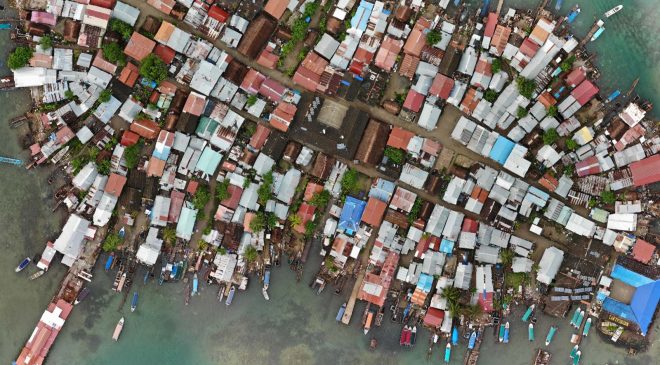
Gardi Sugdub is a tiny, flat, and crowded island of nearly 1,300 people just off Panama’s northern coastline. A part of the Guna Yala autonomous region, the island has been home to Guna Indigenous people for over a century. Originally Gardi Sugdub offered refuge from mainland mosquito-borne illnesses and colonial restrictions, but today, the island faces new challenges. There is no room to expand, and floods are already making life harder for the island’s residents, affecting their rights to adequate housing, health, education, and culture. Some rise in future sea levels is inevitable, according to the latest report of the Intergovernmental Panel on Climate Change, threatening long term island habitability and prompting this community to choose relocation to the mainland as a measure of last resort.
President Laurentino Cortizo promised, after earlier dates for the relocation came and went, that the new site will be ready on September 25, 2023, according to community members. The Housing Ministry recently delayed the date yet again, to February 2024. The new date is the latest in a series of unfulfilled promises that include a partly constructed, now abandoned hospital and glacial progress on building a school. The authorities have not provided a full explanation for the delays to all community members, who have requested greater transparency on timelines and budgetary changes and increasingly fear the new timeline will not be met.
Some governments, such as the Pacific Island nations of Fiji and the Solomon Islands, have developed policies for planned relocation, although no country in the Americas has yet done so. Panama should learn from its experience in Gardi Sugdub and design the first national policy to safeguard peoples’ rights during planned relocation in the Americas.
The international community should also build on lessons learned from the Inter-American Development Bank’s model of community-engaged support for Gardi Sugdub. The bank provided important support for the project from 2018 to 2023, although that support ends this month. As planned relocations are complex and require long term support, future support from development banks and other international organizations requires extended timelines and ongoing monitoring and evaluation.
The relocation of Gardi Sugdub is planned at a time when the Intergovernmental Panel on Climate Change (IPCC), the world’s leading authority on climate science, finds that “as climate risk intensifies, the need for planned relocations will increase.” This reality makes it essential to learn from past experiences of community-led relocation like Gardi Sugdub.
“Governments the world over should plan in an anticipatory, inclusive, and rights-respecting way today to avert foreseeable rights violations in the future,” Bower said.
